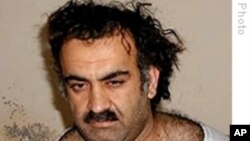In the United States, the wheels of justice sometimes grind slowly, but the case against five suspects who allegedly played pivotal roles in the September 11, 2001, terrorist attacks on the U.S. has lingered at a snail's pace.
Fifteen years or more after their apprehension, the five accused terrorists remain jailed at the U.S. military base at Guantanamo, Cuba. For a variety of reasons, U.S. authorities do not anticipate their trials will start any sooner than some time in 2020, and then could take several years to conclude.
The legal proceedings have been extraordinarily complex, with defense lawyers — a mix of civilian and military attorneys — filing hundreds of motions questioning the conduct of U.S. authorities in their apprehension, then detention and treatment of the suspects, first at secret sites in Thailand and Poland, and subsequently at Guantanamo.
The charges are complicated by U.S. acknowledgment that the defendants were subjected to "enhanced interrogation techniques" after their capture, what critics, including the U.S. Senate Intelligence Committee, have called "torture," including waterboarding to simulate being drowned. More recently, U.S. officials say they have banned the use of such interrogation methods.
One of the suspects is Khalid Sheik Mohammed, a Pakistani Islamist militant who boasted in 2007, "I was responsible for the 9/11 operation — A to Z."
Mohammed, now 53, is accused of first proposing the attacks on the U.S. to al-Qaida leader Osama bin Laden in 1996. Bin Laden was killed in 2011 in a clandestine, middle-of-the-night U.S. special operations raid on his hideout in Pakistan.
The other suspects held at Guantanamo include Walid bin Attash, a 40-year-old Yemeni, who allegedly ran an al-Qaida training camp in Afghanistan where two of the 19 airplane hijackers were trained. And Ramzi bin al-Shibh, 46, a Yemeni, who is accused of helping a German cell of hijackers find flight schools and enter the U.S.
The other two suspects are Ammar al-Baluchi, 41, a Kuwaiti and Mohammed's nephew, who is accused of sending about $120,000 to the hijackers to cover their expenses and flight training. And Mustafa Ahmad al-Hawsawi, 50, a Saudi, who allegedly sent money, western clothing, traveler's checks and credit cards to some of the hijackers.
The path to a trial for the five has meandered from court to court, from a military tribunal to a civilian court and back to the military court in Guantanamo.
The five suspects, all of them apprehended in 2002 or 2003 in Pakistan, were first arraigned in 2008 during the administration of former President George W. Bush. But President Barack Obama suspended the proceedings when he took office a year later, so his top security aides could review the case.
A senior Defense Department official dropped the terrorism charges against the suspects in 2010 "without prejudice," meaning they could again be charged after further investigation.
Obama's attorney general, Eric Holder, decided to try the cases in a civilian court in New York, not far from the World Trade Center site where the hijackers flew commercial jet liners into two skyscrapers, killing nearly 3,000 people.
There was such an outcry of political resistance to Holder's plan, with local officials citing security concerns of holding the trial in New York, that he abandoned the idea and returned the case to the Pentagon. New charges were filed, and the case was sent back to Guantanamo in 2012, where court hearings are held from time to time about issues in the case, although no trial date has been set.











